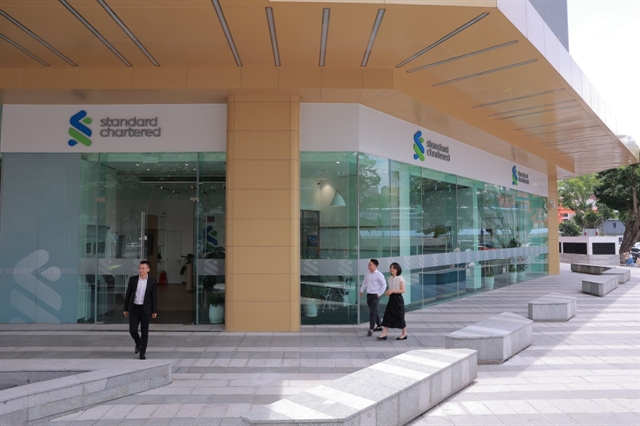 Economy
Economy


|
| Standard Chartered Bank's headquarter in Hà Nội. The bank forecasts the State Bank of Việt Nam will make another 50bps cut in the refinancing rate to 5 per cent by the end of the second quarter. Photo courtesy of the bank |
HÀ NỘI Standard Chartered Bank has lowered Việt Nam’s 2023 GDP growth forecast to 6.5 per cent from the previous 7.2 per cent in its recent macro-economic updates about the country.
The bank also turned more cautious on the external front. April macro indicators showed a moderation. Exports declined 17.1 per cent year-on-year, imports fell 20.5 per cent year-on-year, and industrial production barely rose; the trade surplus rose to US$1.5 billion from $700 million in March.
In the first 4 months of the year, exports fell 11.8 per cent year-on-year; imports were down 15.4 per cent year-on-year with a trade surplus of $6.4 billion. Inflation was 2.8 per cent in April, easing for the third month in a row and down from 4.9 per cent in January; core inflation rose 4.6 per cent as retail sales saw a robust growth of 11.5 per cent. Disbursed FDI in January – April 2023 totalled $5.9 billion, down 1.2 per cent year-on-year; pledged FDI was $8.9 billion, down 17.9 per cent.
“The significant import contraction points to slowing economic activity given Việt Nam’s import-intensive nature, despite still-strong domestic consumption,” said Tim Leelahaphan, Economist for Thailand and Việt Nam, Standard Chartered Bank.
Standard Chartered forecasts the State Bank of Việt Nam (SBV) will make another 50bps cut in the refinancing rate to 5 per cent by the end of second quarter, followed by rates on hold until end-2025. However, it sees upside risk to the rate forecast, especially towards year-end, as the SBV may focus more on financial stability than growth.
“The SBV has shifted to a pro-recovery stance since the start of 2023. In addition to cutting rates, it is aiding businesses facing difficulties by giving them more time to address liquidity shortages. In April, it has allowed easier loan terms, including delaying loan repayments (by up to 12 months) and providing rate waivers. The property market may need further liquidity support, as measures so far appear to have only reduced short-term repayment pressure,” said Tim. VNS




